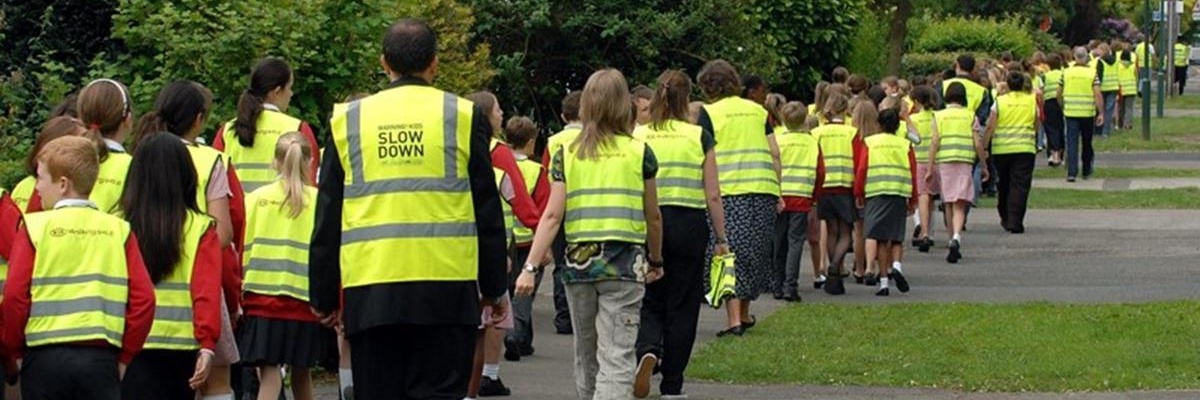Gauge parental interest and support
The first step is to figure out if there is interest and support among other families in your area. You could either work with the school to gauge interest or simply get in touch with parents you already know, tell them about the idea and see if they're interested in getting involved.
Once you've run the idea past a few people and it seems like there is enough local support, it might be worth organising a meeting to discuss some of the logistics and get more parents committed to help you organise.
For the Walking Bus to be viable there must be sufficient adults to cover each journey to and from school each day for every route established. Once started, the bus will operate every day during term time, whatever the weather.
There should be a minimum of 2 adults supervising each route – one to be the driver leading the group and the other to be the conductor following at the rear. This ensures that all the children can be seen and kept under control.
You might want to keep the Walking School Bus limited to your street / housing estate but if you want to widen out the project you could write a letter to parents asking if their children will walk with the bus and whether they will volunteer as conductors/drivers.
At this stage, you might also want to involve school staff, local Gardaí and road safety representatives (more info on that in Step 2).
However wide you decide to widen the project, it'll be important that parents sign a consent form and everyone is comfortable with what's involved both in terms of their time commitment and having their children ready at the agreed pick up point each morning.
You can find a Draft Consent Form in the resources section of the guide which you can download and adapt as necessary - Resources Section
Suggest and test routes
You should carry out risk assessments of the route/(s). Your routes will be determined by the number of children and parents participating and where they live. Remember, walking buses don’t have a legal right to stop traffic, so ensure that there are designated safe places to cross.
When considering road safety,here are some steps you should take:
1. Check with your Local Authority – many have Road Safety and Education Officers that offer road safety training to schools.
2. Check with your local Gardaí – they can provide information on road safety and may become involved with your initiative.
3. Contact the Road Safety Authority – they work with schools to promote road safety and provide safety training. They also have a range of leaflets, DVDs and CDs such as ‘Going to School Safely’ leaflet and the ‘Safe Cross Code’ CD, and a website www.safetoschool.ie
You can find the RSA's walking safely to school guide in the Resources Section or give them a call to find out more info on 1890 40 60 40/ 09625000.
Recruit volunteers
Arrange for the organiser to meet potential helpers and explain the scheme. Obtain personal details: name, address, and telephone number. What days they are available – morning or afternoon. Check their identification (if necessary). If possible set up rota and assign volunteers to routes Try to persuade one volunteer to act a co-ordinator for that route. This gives other volunteers and parents a contact point and will make it easier for the overall organiser.
Recruit Passengers
Inform parents about the chosen route, the starting date and the bus timetable. The bus should operate to a strict timetable and not wait at the bus stop for latecomers. Parents should ensure that they are waiting at the bus stop to drop off and pick up children on the way home unless permission has been given for them to travel home unsupervised. Parents need to remember that they are responsible for their child‟s safety on the way to and form the designated bus stops. Parents should be issued with bus users guidelines and consent forms. Parents should give written consent for children to use the bus and inform the school of their child's usual travel pattern, i.e. the days they will be using the bus going to/from school. It is the responsibility of the parents to let the driver know of any changes to this pattern. Parents are signing to indicate that: They are permitting their children to participate in the scheme. They have impressed upon them the need to behave sensibly and follow any instructions given by adults in charge of the bus. This information needs to be held by the volunteers.
Set Off
It is recommended that volunteers and participating children should wear fluorescent vest with reflective strip when travelling to and from school. Children taking part should be briefed beforehand so they know how to behave. A child who endangers themselves or who misbehaves may be reported to the parent. The parents of a child who continuously misbehaves will be asked to withdraw the child from the Walking Bus.









